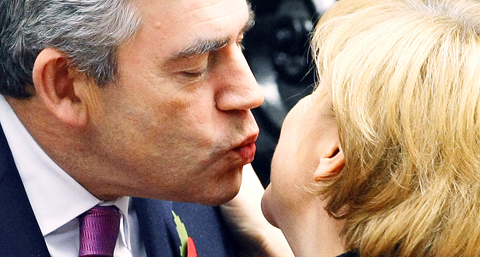British Prime Minister Gordon Brown was scheduled to begin a tour of oil-rich Gulf states yesterday, hoping to persuade them to give extra funds to help countries hit by the world economic turmoil.
Brown will spend four days in the region holding talks with leaders as he pursues his efforts to help coordinate the global response to the world economy’s dramatic plunge.
Earlier this week, he said he wanted the IMF’s US$250 billion bailout fund for countries hit by the financial crisis to be extended to prevent “contagion” spreading to other nations.

PHOTO: AP
The former finance minister said that he wanted Gulf states and China to be among the biggest donors to an expanded scheme.
“It’s the countries that have got substantial reserves, the oil-rich countries and others who are going to be the biggest contributors to this fund,” he said on Tuesday. “I am going to the Gulf at the weekend and it is one of the items that will be in the discussions with all the international leaders.”
The trip comes ahead of a meeting of G20 leaders in Washington including Saudi Arabia’s King Abdullah on Nov. 15 that will discuss a restructuring of the world financial system, including the IMF.
Brown said he has discussed the plan with IMF chief Dominique Strauss-Kahn, as well as French President Nicolas Sarkozy and German Chancellor Angela Merkel.
The IMF is set to bail out Hungary, Ukraine and Iceland, while Pakistan is reportedly poised to apply for IMF assistance over its balance of payments crisis.
But Brown could face a struggle to persuade the Gulf states, despite strong historic and trade links with Britain.
The states, whose main economic driver is oil, have been hit by its price dropping below US$60 a barrel this week from record highs of nearly US$150 in July on fears of falling demand because of the slowdown.
And Brown clashed with leading oil producing countries last week over its emergency cut in production.
OPEC, says it sees no reason why it should bail out a crisis that originated in the US.
OPEC’s Secretary-General Abdalla Salem El-Badri said on Tuesday it was “surprising” that OPEC countries, which produce around 40 percent of the world’s crude, were being asked to help by keeping prices down.

Taiwan Semiconductor Manufacturing Co (TSMC, 台積電) would not produce its most advanced technologies in the US next year, Minister of Economic Affairs J.W. Kuo (郭智輝) said yesterday. Kuo made the comment during an appearance at the legislature, hours after the chipmaker announced that it would invest an additional US$100 billion to expand its manufacturing operations in the US. Asked by Taiwan People’s Party Legislator-at-large Chang Chi-kai (張啟楷) if TSMC would allow its most advanced technologies, the yet-to-be-released 2-nanometer and 1.6-nanometer processes, to go to the US in the near term, Kuo denied it. TSMC recently opened its first US factory, which produces 4-nanometer

PROTECTION: The investigation, which takes aim at exporters such as Canada, Germany and Brazil, came days after Trump unveiled tariff hikes on steel and aluminum products US President Donald Trump on Saturday ordered a probe into potential tariffs on lumber imports — a move threatening to stoke trade tensions — while also pushing for a domestic supply boost. Trump signed an executive order instructing US Secretary of Commerce Howard Lutnick to begin an investigation “to determine the effects on the national security of imports of timber, lumber and their derivative products.” The study might result in new tariffs being imposed, which would pile on top of existing levies. The investigation takes aim at exporters like Canada, Germany and Brazil, with White House officials earlier accusing these economies of

Teleperformance SE, the largest call-center operator in the world, is rolling out an artificial intelligence (AI) system that softens English-speaking Indian workers’ accents in real time in a move the company claims would make them more understandable. The technology, called accent translation, coupled with background noise cancelation, is being deployed in call centers in India, where workers provide customer support to some of Teleperformance’s international clients. The company provides outsourced customer support and content moderation to global companies including Apple Inc, ByteDance Ltd’s (字節跳動) TikTok and Samsung Electronics Co Ltd. “When you have an Indian agent on the line, sometimes it’s hard

PROBE CONTINUES: Those accused falsely represented that the chips would not be transferred to a person other than the authorized end users, court papers said Singapore charged three men with fraud in a case local media have linked to the movement of Nvidia’s advanced chips from the city-state to Chinese artificial intelligence (AI) firm DeepSeek (深度求索). The US is investigating if DeepSeek, the Chinese company whose AI model’s performance rocked the tech world in January, has been using US chips that are not allowed to be shipped to China, Reuters reported earlier. The Singapore case is part of a broader police investigation of 22 individuals and companies suspected of false representation, amid concerns that organized AI chip smuggling to China has been tracked out of nations such